Ronnie is key to snooker's future
http://www.supremesnooker.com/features/
11 June 2008
Forget the politics of the WPBSA for a moment. Forget the fact there are less than half the world ranking events on the calendar there were ten years ago. Forget the impact of the tobacco ban. Even forget the fact that the overall standard is higher than ever and the television ratings are healthy. The reality is, snooker is on a downer.
Looking at the first few days of the 888.com World Championship, one thing, more than any other depresses me. With the best players in the world on show, in the most prestigious tournament of the year, the arena at The Crucible theatre, which is far from the biggest venue around, is less than half full. I have one simple question: Why?
The reality, it seems, is explained pretty well by the issues raised in the first part of this feature. To cut to the chase, the characters just aren’t around anymore, and the players of today, no matter how good they are, do not excite people to get off their backsides in large numbers and fork out good money to watch them play.
It’s not that people aren’t interested in watching snooker anymore- far from it. Ask Barry Hearn, he’ll tell you what the problem is. Yes, he is right when he says that the biggest mistake the snooker authorities made in the 1990s was discarding the established stars before the new generation had been given time to bed in.
Another thing Barry will tell you is that selling tickets for his Premier League events is rarely a problem. On those Thursday evenings in the latter months of the year, venues up and down the country sell out in no time. Why is this? Well, look at the players on show.
There’s Steve Davis, some fifteen years past his prime but still prone to moments of sheer brilliance. There’s Jimmy White, who is nowhere near the player he once was, and doesn’t seem likely to qualify for major tournaments again, but there’s no denying the regard in which he is held by most snooker fans. There’s Stephen Hendry, who many consider the greatest of them all. And, of course, there’s Ronnie. More on him in a moment.
Barry chooses the select players not solely on their ability, but on those most likely to attract people to the arena, an, more importantly, sponsors and television companies across the world to the event. For that reason, you can guarantee a player from the Far East will be invited every year, simply to get their TV audience. Even if they weren’t right up there with the best (which, of course, they now are), their invitations can be taken for granted. In fact, I wouldn’t be at all surprised to see both Ding Junhui and Marco Fu invited next year.
So what do all these names have in common? They are all players you’d tune in to watch. Davis and White, the old timers. Hendry, the grey man of snooker who dominated the 90s. The Asian players, who will keep millions of fans glued to the edge of their seats back home every time they play, and Ronnie, no explanation needed.
In Britain especially, Ronnie seems to be the only player who can motivate people to pay good money to watch him play in the arena. TV ratings go through the roof every time he plays. Here is the man who has everything. Probably the most naturally gifted player of all time, everything about him is exciting.
The way he pots the balls with such natural ease. The speed at which he moves around the table, barely pausing to think about the shot he’s about to play. The way he switches from right to left hand and back again without a moment’s thought. And, of course, his off-the-table behaviour and sheer unpredictability. Ronnie might not know it, but all these factors make him a vital ingredient if the sport is to thrive in the future.
Because of his status, he has taken on a whole new set of responsibilities. The truth is, he stirs up emotions in people. I am well aware that a small minority of snooker fans hate him, but they really are a tiny minority. But even his biggest fans are beginning to lose patience with certain aspects of his behaviour. Let us first of all make a few allowances and accept a some facts:
Firstly, there is no denying that Ronnie is a man with problems. He clearly loves his father and it hurts him deeply to see him stuck behind bars, albeit for a violent and wicked crime.
Secondly, Ronnie suffers from depression. Make no mistake, this is not just a severe case of feeling fed up with life. It is a dark cloud that hangs over your head, and, at its worst, makes getting through each day extremely difficult. I would understand entirely if he just wanted to skip press conferences and interviews from time to time, that wouldn’t be an issue.
However, his actions, on occasions, have been inexcusable and have brought the game into disrepute.
His behaviour at the 2006 UK Championship, where he walked out midway through a match, were completely unacceptable. People had taken a day off work, travelled long distances and paid good money to watch him play, and deserved to see a full and competitive match, end of story.
He later claimed he was struggling to come to terms with Paul Hunter’s death at the time. Of course, all snooker fans were affected to a certain degree by this tragic loss, but didn’t it occur to him to think for a moment that the last thing Paul would want, or would ever do himself, would be to walk out on a match mid-way through a session?
There have been other instances before and since then, but his recent behaviour in the press conference after his defeat to Marco Fu in the China Open was a massive step too far.
If he thought the press conference was too much to handle, for whatever reason, he should’ve just not attended. He could have confided his reasons to a tournament official, or, in the worst case, accepted a fine for failing to turn up. Ronnie’s vulgar language and innuendo has left parents less willing to allow their children to use Ronnie as a role model, and sponsors less willing to be associated with a man, and indeed a sport, where behaviour like this occurs.
Eccentric behaviour is a good thing, individuality is wonderful and the current lack of it is a major reason why snooker is on such a downer at the moment. But lewd behaviour like this is bad news for all parties.
Ronnie has apologised for what he’s said, and I don’t doubt his sincerity for a moment. However, I don’t think he understands the impact of what he’s done. He says that he’ll voluntarily pull out of tournaments if that’s what it takes to put things right.
Of course, this is the last thing snooker needs. A tournament without Ronnie is a major turn off. TV viewing figures will be affected, sponsors will be less inclined to invest in the sport, and arenas will often be left half empty. What the sport does need, and fast, is a Ronnie who comes to appreciate the sheer scale of his power, and, even more importantly, the very serious responsibilities that come with it.
In sport, image is everything. Footballers are endlessly being told that they are role models and that they have a duty to set a good example to their young fans. Whenever any Premier League star goes off the rails, the letters pages of every national newspaper are infiltrated with letters from parents saying that these players have a duty to set a good example both on and off the pitch. Yes, we’ve heard it all a million times before, so I won’t repeat the tired old speech again now.
When we think of image, sport and role models, our minds quite naturally turn to football, and rightly so, as it is undoubtedly the sport which appeals to Britain’s children the most. Yet setting a good example extends to all sports, not just football.
There have been plenty of examples outside football just recently. Listening to a radio phone-in about Dwain Chambers’ return to athletics a few weeks ago, there was one call after another from parents wondering how they can look their children in the eye and tell them not to cheat, now that Chambers was allowed to compete again. And hey, it’s Olympic year, so you can be certain the whole drugs in sport question will crop up time and time again over the coming months.
Even sports that do not rely much on physical prowess know that image is important. When the Professional Darts Corporation launched in the mid 1990s, with the aim of putting the sport back on television on a regular basis, one of the first things they did was to ban drinking alcohol and smoking on stage. Dick Allix, Tommy Cox and the other founders clearly realised that no matter how talented and dedicated the players, if they were to be seen behaving like this on screen, their sport would not be an attractive proposition to broadcasters and advertisers, and parents would not necessarily want to sit down with their children and watch it, because the players would not be setting a suitable example.
Snooker has been treading a similar path, albeit in a more piecemeal way than darts. Going back to when the snooker was at its most popular in the 1980s, Barry Hearn, who at the time managed most of the top players, knew the importance of image when putting together his Matchroom Team. Every player he managed had to comply with the required image- clean-cut, well presented and family-friendly. When Jimmy White signed up, he was expected to clean up his lifestyle, and to a lesser extent so was his pal, Tony Meo. When Terry Griffiths resumed his smoking habit after managing to quit for a few years, Barry was furious, to put it mildly. He was never too keen on seeing his players smoke on television, but Terry insisted it was the only way he could control his nerves.
Barry never for a second considered signing up Alex Higgins. He knew full well that The Hurricane was too much of a risk, and susceptible to go off the rails and do his own thing. The obnoxious Howard Kruger took it upon himself to set up a rival team of players, called Framework, in which he sought to sign up what he called an “exciting” team of players, led by Higgins, which became a team of snooker’s so-called “bad boys”. In reality, advertisers and sponsors hardly rushed to be associated with such high-risk players, and such a team was never going to be an attractive commercial proposition.
Barry, on the other hand, pitched his team perfectly, and Matchroom Sport became a commercial success. He probably won’t thank me for reminding the public of this, but at one stage there were Matchroom slippers on sale, and men entering arenas for snooker exhibitions could expect to be squired with Matchroom aftershave by dolly birds. The rest, as they say, is history, and Matchroom Sport is now involved with all sorts of different sporting events.
Into the modern era, and snooker’s image has faced many challenges in improving its image. Central to this was the tobacco ban. There appears to be no logical reason why sporting events should not be sponsored by tobacco when one thinks about it for any more than a few seconds. Yes, we are all aware that smoking does not do our health any good and that young people watching should not be encouraged to take up the habit.
But then again, look at what has happened to most sports, including snooker, as a result of the ban. Tobacco sponsorship has been replaced by adverts for online gambling firms and alcoholic drinks. Neither of these habits, when done to excess, can exactly be described as “healthy” either. Besides, is there anyone out there who ever took up smoking as a result of a snooker tournament being sponsored by a tobacco manufacturer? No, didn’t think so. Of course, the true purpose of tobacco advertising was brand switching.
Players smoking, on the other hand, is a different matter. As Barry Hearn knew more than twenty years ago, a player smoking whilst sitting in his chair does neither his image, nor that of the sport any good. The players themselves are role models, and they have a duty to promote a healthy image to young people watching. That is why the ban on players smoking whilst sitting in their chairs is to be welcomed. By the time that ban came in, only Stephen Lee was regularly seen smoking. Other leading players who smoke (and there are a fair number of them) chose not to do so in the arenas.
With only a few examples of unsavoury behaviour from snooker players in recent years, it is safe to say that virtually all snooker players are suitable role models for young people. The practice, dedication and commitment they put into their trade is an example to all youngsters, regardless of whether or not they wish to pursue a career in this great sport themselves.
Yet snooker itself has faced problems. This is not the time to be going into the rights and wrongs of the way in which the WPBSA has managed the sport in recent years, but the aforementioned tobacco sponsorship ban certainly did the sport no favours from a financial perspective. Snooker was heavily reliant on tobacco sponsorship, perhaps overly so, until the ban came in, and the drastic reduction in the number of tournaments, and in the prize money on offer to those that remain, can, to a large extent, be attributed to this fact.
But there’s more to it than that. Despite the fine examples the players set, snooker still has an image problem, one which isn’t easy to define or solve. Most of us know what it is, though. Think back to the 80s, when leading snooker players were household names, even in homes where sport was only rarely watched. Everyone had their favourite player. Everyone had a player who they didn’t like. Every player was a character in his own right. There were the fast, exhilarating ones. There were those who could make a crowd laugh. There were a small few who, we all knew led less-than puritanical lives away from the table, but that made them all the more entertaining. Even Steve Davis was interesting. Interesting for being boring that is. Yet even his stony concentration was fascinating to watch.
The players of today have one significant disadvantage over the players of the 80s. Back then, the players who graced our screens came from a background of playing exhibition matches to earn their living. They simply had to know how to make an audience laugh, or play in an entertaining way, or have some kind of gimmick that made them stand out from the rest.
Modern-day players simply didn’t have to do that. From a young age, it’s been practice, practice, practice all the way. Few, if any, would know how to tell a joke. Few have ever been encouraged to behave or dress eccentrically to entertain a crowd.
Risky, but hugely entertaining shots such as doubling a red have gone out of the game in favour of caution and safety, and most players rarely show any form of expression when in the arena, or say anything of note in post-match interviews. That is not meant as a dig at any of the modern players, but even they would admit these are the realities of the game as it is today. Even though standards of play are higher than ever, a lot of the charm that made snooker so popular has disappeared from the game.
It is because of this that Ronnie O’Sullivan is so important to snooker’s future, and why his conduct on and off the table matters so much.
29. 4. Robert
Návštěvnost stránek
ANTEE s.r.o. - Tvorba webových stránek, Redakční systém IPO


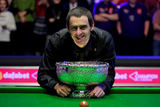
![Welsh Open[2].jpg](image.php?nid=1380&oid=3689245&width=160&height=174)
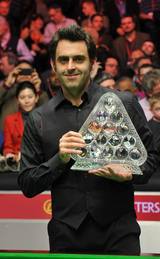

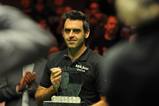
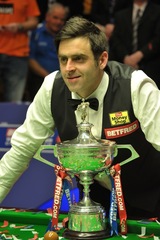
![Ronnie_OSullivan_Snooker_Champion_PTC7_2011[2].jpg](image.php?nid=1380&oid=2439625&width=160&height=151)
![topimage[2].jpg](image.php?nid=1380&oid=2498497&width=160&height=141)
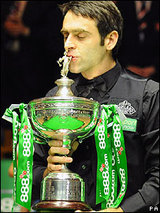
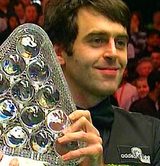
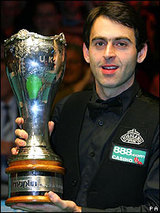

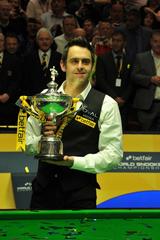

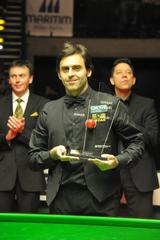

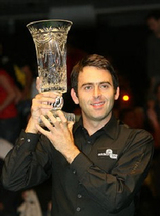
![08%20pls%20ronnie%20trophy[3].jpg](image.php?nid=1380&oid=1189442&width=160&height=198)
